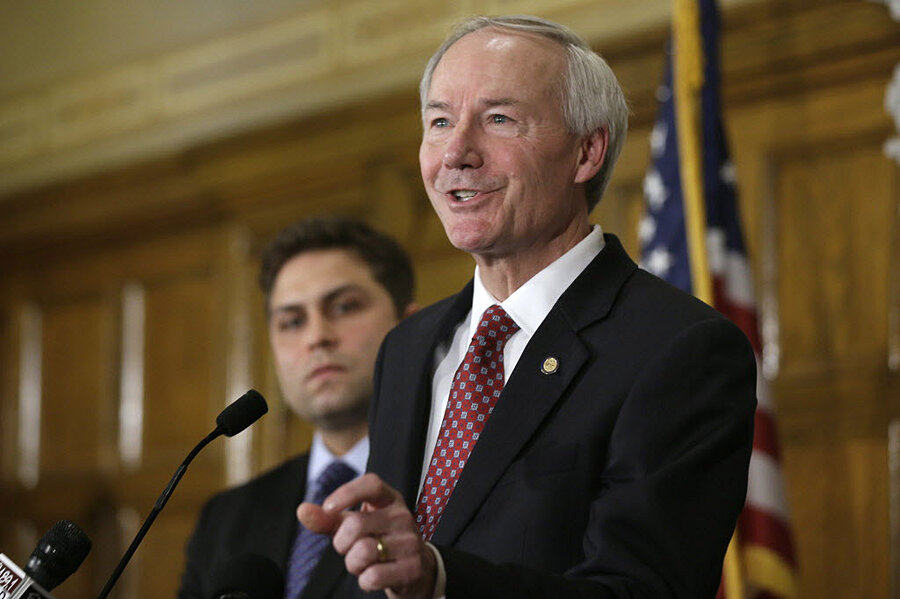Why Arkansas governor won't sign the Religious Freedom Restoration Act
Loading...
Responding to sharp criticism from local businesses and civic groups, Arkansas Gov. Asa Hutchinson (R) announced Wednesday that he would not sign his state's new religious freedom bill, unless it is amended to reflect federal law.
The bill, which passed the GOP-controlled legislature on Tuesday, would have “a negative impact on our state’s image," Governor Hutchinson said.
"We wanted to have it [the bill] crafted similar to what is at the federal level," he said. "To do that, though, changes need to be made. The bill that is on my desk at the present time does not precisely mirror the federal law."
His decision comes as Indiana lawmakers face a backlash over their own version of the Religious Freedom Restoration Act (RFRA), which critics say permits discrimination against sexual minorities. The Arkansas measure is similar to the embattled Indiana law and, in some respects, affords even less protection against discrimination.
Prominent businesses and sports associations, such as Apple and the NCAA, put pressure on Indiana Gov. Mike Pence (R) to backtrack on the law. But in Arkansas, it was Wal-Mart, the state’s largest employer, applying most of the pressure. Its appeals appear to have paid off.
The bill "threatens to undermine the spirit of inclusion present throughout the state," said Wal-Mart CEO Doug McMillon in a statement posted on Twitter urging the governor to veto the bill.
The intensity of the backlash against religious freedom laws stunned many politicians. While 20 US states have Religious Freedom Restoration Acts that are similar to the federal law, most of the criticism levied against the bills in Arkansas and Indiana focused on how they differed from the federal version.
Unlike the laws in most other states, the Indiana law was specifically written to ensure that businesses can use it to defend themselves against civil rights lawsuits, critics say.
The Indiana law explicitly allows any for-profit business to assert a right to “the free exercise of religion” and to use that as a defense against a private lawsuit by another person, rather than simply against actions brought by the government. The only other RFRA that affords such protection to for-profit businesses is South Carolina. Louisiana and Pennsylvania, on the other hand, specifically exclude for-profit businesses from such protection.
Both Indiana's law and the Arkansas bill allow large corporations to claim that their religious faith is violated by a ruling or mandate. In other states with RFRA legislation, only individuals or family businesses can make such a claim.
As Garrett Epps points out in the Atlantic: “The Indiana statute explicitly recognizes that a for-profit corporation has 'free exercise' rights matching those of individuals or churches. A lot of legal thinkers thought that idea was outlandish until last year’s decision in Burwell v. Hobby Lobby Stores, in which the court’s five conservatives interpreted the federal RFRA to give some corporate employers a religious veto over their employees’ statutory right to contraceptive coverage.”
Also like the Indiana law, the Arkansas bill would have allowed religious parties to go to court if they feared that a “likely” state action would impinge on their beliefs, even if it hadn’t already happened.
In some respects, the Arkansas RFRA would have been even more stringent than the Indiana law. Legal experts point out that the original Arkansas act would have made it harder for the government to override a claim of religious exemption, The New York Times reported.
In the original Arkansas bill, the state would have to show that a law or requirement that someone challenged was “essential” to the furtherance of a compelling governmental interest, a word that is not included in the federal law or the law in other states, including Indiana.
But opponents won a victory on Wednesday, as Hutchinson called for changes in line with the 1993 legislation signed by President Clinton.
Meanwhile, the governor also announced that he is considering using an executive order to make “Arkansas a place of tolerance," CNN reported.








